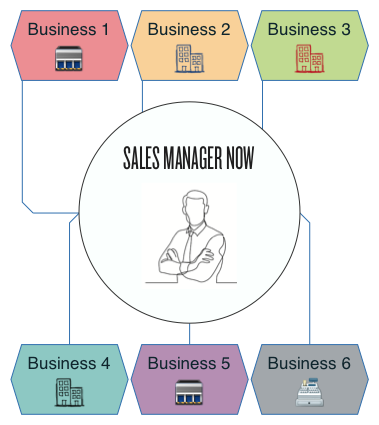Our firm began practicing fractional sales management in early 2006, and nearly 20 years later,…
Selling Fundamentals
Service-Minded Selling Fundamentals
This is a collection of the beliefs, practices, and skills to develop to sell from a Service-Minded position.
By Rene Zamora
Selling Beliefs
No ONE sale matters
We realize that businesses don’t need our service and might choose others to do business with. We also know that if we are doing our job, we will have plenty of potential customers in our pipeline, allowing us to maintain the perspective that if any prospect declines our service, it will not be a make-or-break proposition. By staying active and seeking to serve as many customers as our time allows, No One Sale will matter that much.
Bad news early is good news
This is good for two reasons. First, the earlier you hear the news you can decide if something can be remedied. Secondly, if you cannot remedy the situation, the earlier you let go of an unqualified lead, the better. There are too many opportunities in the market to spend time working on hopefuls when you can work with more qualified leads.
Assume a position of partner
Professional salespeople are highly appreciated and valued by savvy business owners. They need professional salespeople to help them make good buying decisions for their business. We work hard to be professional and approach each prospect and customer with the premise that we are their partner from the first time we contact them. We don’t view customers as “a sale”; we value them as a long-term relationship that might buy today or in three years.
Sales flow naturally through serving others
We understand that if we are serving our customers and maintaining the proper activity, sales will follow. We approach service proactively and reactively. In other words, we don’t wait around for orders we serve by opening conversations, helping others discover their needs, educating, being honest, and presenting solutions we believe will serve our customers.
Our attitude accounts for 70% of our effectiveness
It is our responsibility as a salesperson to manage our attitude. The company counts on us as a professional to maintain a positive attitude, and that attitude is demonstrated through our actions. Ways we can maintain an effective attitude is to
- Remain grateful
- Build our spiritual strength
- Be other focused
How To Serve
- Be an Intelligent Marketer – Exposing potential buyers to products, services, and ideas that can help them achieve their goals.
- Consulting – Be thorough in the assessment of problems and goals
- Advising – Being a trusted industry resource.
- Proposing – Proposing a good value that solves their problem or achieves their goal.
- Following up – Ensuring customer expectations are met or exceeded.
Service Minded Practices
Be courteous
- Always ask permission for customers’ time.
- Offer choices
- Be punctual
Be an expert, not a product and/or service dumper
- Use products/service benefits to ask questions that discover needs.
- If using a demo, be brief and to the point confirming if the customer has a need.
- Don’t count on your bells and whistles to make a sale until you know which bells and whistles they need and why.
- A demo or trial to expand a client’s understanding without pushing solutions is a very good tool.
- You need to know your products well to understand how they can benefit.
Understand customers’ problems, goals, and buying motives before offering solutions.
- Learn more about their business than them learning about yours.
- Let them speak over half the time to be successful.
- Find out why they want a system, not what system they want.
- Be very clear about what their problems or goals are in investing.
Always agree on the next sales step with the prospect or customer.
- Before you leave or get off the phone with a prospect or customer, agree on your next step (call back, appt., installation, abandoned lead).
- As a professional salesperson, it is your responsibility of service to help buyers reach their buying decision. Moving things forward supports decisions.
Always have a personally qualified list of prospects to call before calling.
- Before you pick up the phone to dial for appointments, take the time to prepare a list of those people you will be calling.
- Not having a list is a surefire way of procrastinating making calls or spending time pre-judging the call before you dial.
Be clear and confident about your pricing
- Know your company pricing strategy
- Know the value you offer
- Communicate your price confidently
Before sharing a solution, ask another question
- As a rule of thumb, force yourself to ask one more question before offering solutions or sharing a benefit.
- Become an expert at asking questions leading to problems, goals, needs, or pain.
Practice patient urgency
- Prospects are busy, and you will land at different places on their priority list.
- It is your responsibility to keep the ball moving and, at the same time, be patient if they are not ready to move.
- The better you identify true needs, goals, and problems, the higher you will remain on a priority list.
- The more urgent you are with your High Pay-off Activity, the easier it becomes to be patient with client choices.
Skills to Develop
Effective Communication
- People understand your message (verbal and written)
- You understand others’ messages (verbal and written)
- Being an active listener
- Eliminate or minimize assumptions and guessing
- Confident in presenting proposals, asking for orders, and discussing concerns.
Building Rapport
- Develop trust
- Be sensitive to each buyer’s situation and motives (empathy)
- Know your products and services
- Keep your promises
- Be genuinely interested in buyers and their businesses
Asking Questions
- Asking relevant questions
- Ask questions that cause buyers to think of things they have not
- Ask questions that uncover emotional and practical buying motives
Problem Solving
- Identifying root problems for customers
- Ability to identify the correct application to solve problems
- Assess the complete environment to prevent new problems from arising from your solution
Adaptability
- To different personalities
- To changes in situations and plans
Managing Details
- Documenting your notes and next steps
- Keep your CRM updated daily
- Keep the calendar current and use it
- Delegate what you can to the support team provided
- Close the loop on all activity
- Use your lead time wisely
- Completing all required paperwork on time
Comments (1)
Comments are closed.




[…] order for a boost to work, you need to have your selling fundamentals in order. I’m assuming you’ve been adding opportunities, making presentations, asking for […]